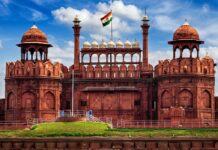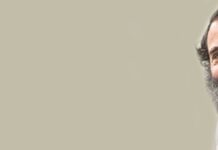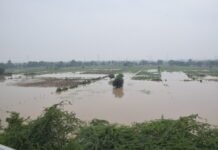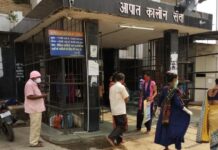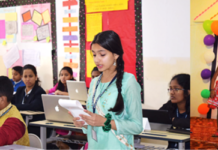[vc_row][vc_column][vc_column_text]
With the last shahisnan (royal dip) on April 27 the biggest religious congregation Kumbh Mela 2021 draws to a close on April 30 at Haridwar amidst second wave of Coronavirus pandemic sweeping the length and breadth of the country taking the death and mayhem to cataclysmic proportion. Even as the daily dose of Covid casualties is 2,000 plus deaths in over 3.6 lakh cases the Mela, touted to be a super spreader event, is being closely watched in anticipation of a possible unprecedented boost to the surging Covid19 cases, a situation described by WHO chief as “beyond heartbreaking”.
Kumbh, polls still ticking, tide over the crisis with life-first approach
As heart-rending stories of people in desperation begging for oxygen in their last ditch bid to save their loved ones and the scramble for space at graveyards and cremation grounds for a decent end for the dead are pouring in from across the country, it’s a moment of reckoning for all of us. While looking for possible causes of the rapid surge in the corona cases during the second wave we need to introspect and ascertain where went wrong. Is the current Covid situation the fallout of our collective complacency?
Didn’t we become complacent after the first wave of the Coronavirus showed signs of receding? If we had taken the news of the second wave of the pandemic emanating from other countries, we would have been better prepared to take on the challenge. After the first wave, we had enough time to put our act together in the fight against the deadly virus. We could have streamlined the healthcare infrastructure and equipped ourselves with all the paraphernalia including oxygen and vaccines to meet any exigency. But we did not. Rather we chose to look away as news of fresh covid cases and deaths were trickling in.
The massive rallies witnessed in five poll-bound states were enough proof of our indiscretion. This reflects the lackadaisical approach of our politicians towards public health and hygiene. As if this was not enough, the Kumbh was given a go-ahead knowing full well that it could prove a ticking time bomb for the entire country as devotees would come from every nook and corner of India. However, it’s heartening to note that the Uttarakhand government has taken a timely decision to suspend the Char Dham Yatra, a pilgrimage which was scheduled to start from May 14. The decision was taken in view of a dramatic rise in the cases of Covid19 in the state. State Chief Minister Tirath Singh Rawat said only priests of the four temples will perform rituals and puja.
Did we learn from the first wave?
There is no denying the fact that the second wave has caught the country off guard. In its second avatar, the surge of the viral infection is faster and more lethal. So much so that healthcare system has woefully failed to keep pace with its spread far and wide. According to Reuters, one person is dying of Covid every four minutes in New Delhi, the national capital, one of the hardest hit cities in the country.
From all the reckonings, the country doesn’t seem to be prepared for such an unprecedented calamity. How else could one explain the indifference of the administration in the face of a humanitarian crisis of such unprecedented magnitude?
Between January and early February, as the cases started receding the entire country seemed to have taken coronavirus for granted. State after state lowered its guard against the disease throwing the Corona protocol to the wind. Covid special facilities and SOPs were discarded. Public places had become thoroughfares in absence of strict implementation of Covid protocols. While the two massive events are yet to super spreader, there was no justification whatsoever for the conduct of the elections and then Kumbh Mela at a time when the country was going through catastrophic developments.
What’s more, the administration was so preoccupied with trivia that it didn’t even deem it fit to utilise the recession in the Covid cases for the upgradation of healthcare infrastructure and keeping a contingency plan ready to meet the any eventuality. Even as National Disaster Management Act (NDMA) in place there is no proof of any push for streamlining the facilities by incentivising the businesses to divert attention towards creating Covid-specific infrastructure. The result is there for all of us to see. People are dying more from lack of adequate oxygen supply, scarcity of ventilators, beds and essential medicine than coronavirus infection.
January-February was also the time when an impending threat of a new Covid19 variant was looming over the country. Scientists had already forewarned the country against the new virus strain which was witnessed in the West. They had predicted that once in the air, it could hit us hard. But our governments didn’t take the warning as seriously as it deserved. The blood and gore we see all around today is a a reflection on the policy paralysis. Rather than taking concrete steps to ameliorate the sufferings of the affected people the administration was content with sermonising people on how to become atm nirbhar (self reliant) while patting itself for the declining trend in the first wave corona cases.
The unprecedented surge in the Covid cases today is clearly the result of governance failure. If only we had learnt a lesson or two from its 2020 Covid 19 experience, things would certainly not have come to such a pass.
How India can handle the second wave?
According to the World Health Organization (WHO), the wave of Covid-19 infections in India is the result of a “perfect storm” of mass gatherings, more contagious variants and low vaccination rates.
From mid May when several leading scientific institutes had predicted 6 to 8 lakh daily corona cases in India till the current Covid situation, India had a golden opportunity to prepare itself for the challenge by streamlining its healthcare facilities. But the country chose to squander the golden moments and allowed the crisis spiral out of control in the absence of a determined effort to address it.
Under the current scenario, the only option left to India in the seemingly insurmountable crisis is to utilise all available resources at hand to prevent further spread of the virus as predicted by the scientists. Acknowledge of the mistakes even at this late stage is welcome as long as it helps undo the damage done. Blanket ban on mass gatherings coupled with aggressive vaccination campaign will go a long way in ridding the country of the scourge. While the public is doing its bit to help people in distress, the first priority of the administration should be to save the lives. For this end, the administration has to undertake the following tasks on war footing:
- Identifying the crises – of life saving equipment, drugs and infrastructure
- Incentivising the business models for meeting the emergency demand
- Encouraging the existing business infrastructure to pool in resources to meet the demands of life saving medical supplies required for Covid specific treatment
It’s time public health was defined as not only the right choice but also the right of the public and an obligation of the state. Working on the principles of ‘life first’ the policy makers and the lawmakers should put in all their efforts and resources to save precious human lives.
[/vc_column_text][/vc_column][/vc_row]
Disclaimer: We do undertake rigorous checks on content provided by contributors before publishing the same. If you come across some factual errors, kindly bring this into our notice and we shall review your objection and claim as per our policy and display correction credits and corrections on the article itself.
The opinion expressed in the article is of the writer. Writer is a freelance journalist/journalist based in Delhi

